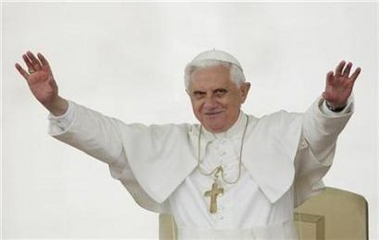Unprecedented Muslim call for peace with Christians
Updated: 2007-10-12 11:36
LONDON -- More than 130 Muslim scholars from around the globe called on Thursday for peace and understanding between Islam and Christianity, saying "the very survival of the world itself is perhaps at stake."
 Pope Benedict XVI greets faithful during his weekly general audience in Saint Peter's square at the Vatican October 10, 2007. More than 130 Muslim scholars called on Thursday for peace and understanding between Islam and Christianity, saying 'the very survival of the world itself is perhaps at stake'. [Agencies] |
In an unprecedented letter to Pope Benedict and other Christian leaders, 138 Muslim scholars said finding common ground between the world's biggest faiths was not simply a matter for polite dialogue between religious leaders.
"If Muslims and Christians are not at peace, the world cannot be at peace. With the terrible weaponry of the modern world; with Muslims and Christians intertwined everywhere as never before, no side can unilaterally win a conflict between more than half of the world's inhabitants," the scholars wrote.
"Our common future is at stake. The very survival of the world itself is perhaps at stake," they wrote, adding that Islam and Christianity already agreed that love of God and neighbor were the two most important commandments of their faiths.
Relations between Muslims and Christians have been strained as al Qaeda has struck around the world and as the United States and other Western countries intervened in Iraq and Afghanistan.
Such a joint letter is unprecedented in Islam, which has no central authority that speaks on behalf of all worshippers.
The list of signatories includes senior figures throughout the Middle East, Asia, Africa, Europe and North America. They represent Sunni, Shi'ite and Sufi schools of Islam.
Among them were the grand muftis of Egypt, Palestine, Oman, Jordan, Syria, Bosnia and Russia and many imams and scholars. War-torn Iraq was represented by both Shi'ites and Sunnis.
Mustafa Cagrici, the mufti who prayed with Benedict in Istanbul's Blue Mosque last year, was also on the list, as was the popular Egyptian television preacher Amr Khaled.
"Mainstream Voices Drowned Out"
The letter was addressed to the Pope, leaders of Orthodox Christian churches, Anglican leader Archbishop of Canterbury Rowan Williams and the heads of the world alliances of the Lutheran, Methodist, Baptist and Reformed churches.
Williams said he welcomed it as "indicative of the kind of relationship for which we yearn in all parts of the world."
"The call to respect, peace and goodwill should now be taken up by Christians and Muslims at all levels and in all countries," he said.
A Vatican official in Rome said the Roman Catholic Church would not comment until it had time to read the letter.
Aref Ali Nayed, one of the signatories and a senior adviser to the Cambridge Interfaith Program at Cambridge University in Britain, said the signatories represented the "99.9 percent of Muslims" who follow mainstream schools and oppose extremism.
"In Islam we have had a problem for some time now where the mainstream voices are drowned out by a minority that choose violence," he said.
Nayed said organizers of the letter had set up an ad hoc network among Muslim leaders that could lead to more cooperation in future.
"These people don't take their signatures lightly," he said. "We are trying to institutionalize this so we don't lose it."
The overture to Christians could be followed by similar letters addressed to Jews or secularists, he added.
Pope Benedict sparked Muslim protests last year with a speech hinting Islam was violent and irrational. It prompted 38 Muslim scholars to write a letter challenging his view of Islam and accepting his call for serious Christian-Muslim dialogue.
Benedict repeatedly expressed regret for the reaction to the speech, but stopped short of a clear apology sought by Muslims.
The new letter argues in theological terms, giving quotes from the Koran and the Bible that show both Christianity and Islam considered love of God as their greatest commandment and love of neighbor as the second greatest.
"The basis for this peace and understanding already exists," it said. "It is part of the very foundational principles of both faiths: love of the one God and love of the neighbor."
|
|
|
||
|
||
|
|
|
|